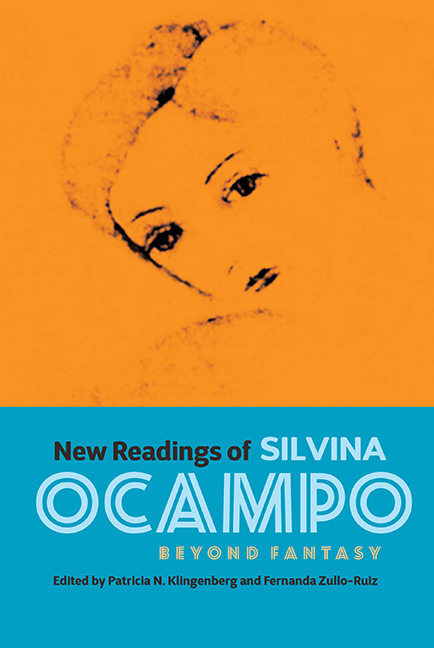Book contents
- Frontmatter
- Contents
- Illustrations
- Contributors
- Acknowledgments
- Introduction: Reading Silvina Ocampo
- 1 Silvina Ocampo for the Twenty-first Century: A Review of Recent Criticism
- 2 Re-reading Autobiografía de Irene: Writing and its Double in the Narrative of Silvina Ocampo
- 3 Sur in the 1960s: Toward a New Critical Sensibility
- 4 Reading Cruelty in Silvina Ocampo's Short Fiction: Theme, Style, and Narrative Resistance
- 5 Eros and its Archetypes in Silvina Ocampo's Later Stories
- 6 In Memory of Silvina Ocampo
- 7 Classical Reference in Silvina Ocampo's Poetry
- 8 Silvina Ocampo and Translation
- 9 The Gender-Bending Mother of “Santa Teodora”
- 10 Illicit Domains: Homage to Silvina Ocampo in Alejandra Pizarnik's Works
- Afterword: Reflections on Silvina Ocampo
- Bibliography
- Index
9 - The Gender-Bending Mother of “Santa Teodora”
Published online by Cambridge University Press: 31 March 2017
- Frontmatter
- Contents
- Illustrations
- Contributors
- Acknowledgments
- Introduction: Reading Silvina Ocampo
- 1 Silvina Ocampo for the Twenty-first Century: A Review of Recent Criticism
- 2 Re-reading Autobiografía de Irene: Writing and its Double in the Narrative of Silvina Ocampo
- 3 Sur in the 1960s: Toward a New Critical Sensibility
- 4 Reading Cruelty in Silvina Ocampo's Short Fiction: Theme, Style, and Narrative Resistance
- 5 Eros and its Archetypes in Silvina Ocampo's Later Stories
- 6 In Memory of Silvina Ocampo
- 7 Classical Reference in Silvina Ocampo's Poetry
- 8 Silvina Ocampo and Translation
- 9 The Gender-Bending Mother of “Santa Teodora”
- 10 Illicit Domains: Homage to Silvina Ocampo in Alejandra Pizarnik's Works
- Afterword: Reflections on Silvina Ocampo
- Bibliography
- Index
Summary
In What Does a Woman Want? Reading and Sexual Difference, Shoshana Felman claims that “mothers live, as mothers, through and for the story of the Other. The story of the mother … is precisely one of having no autobiography, no story of her own” (146–47). Many of Silvina Ocampo's texts bear witness to precisely that elimination or negation of the mother's story, yet one of her unique poems, “Santa Teodora” (which appeared in Amarillo Celeste, 1972, and later in Breve Santoral, 1984), both supports and subverts this postulate. By blurring the distinctions between motherhood and fatherhood, woman and man, heterosexuality and homosexuality, this poem investigates these identities through the lens of sexuality, thus allowing Teodora's body to reveal her own story.
The poem emphasizes the centralizing force of sexuality in the construction of the mother position, so much so that it (con)fuses sexuality and motherhood: the speaker in the poem is a woman masquerading as a man who is then accused of raping and impregnating a young woman. A series of tensions between the seen and heard, fiction and reality, exterior and interior demonstrate the irony of the tenuously gendered position. Is “she” a transgender mother? Is “she” a father in drag? What role does sexuality “play” in this gendered farce? This poem alludes to “ever shifting realities” through the performative nature of gender that Judith Butler ponders and the alterability that Donna Haraway theorizes. Through the voice and situation of the main character a closer inspection of a particular maternal paradigm is possible; Teodora opens up the virginal, saintly, Madonna-like conceptualization of motherhood and simultaneously forces a re-evaluation of the conflictive paternal role vis-à-vis her very presence.
The conventional form of the poem, a sonnet, tells the very unconventional story of the main character, Teodora, a woman who takes on the identity of a man.
- Type
- Chapter
- Information
- New Readings of Silvina OcampoBeyond Fantasy, pp. 197 - 210Publisher: Boydell & BrewerPrint publication year: 2016

